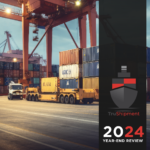Artificial intelligence (AI) is revolutionizing the logistics industry, providing innovative solutions to enhance operational efficiency and decision-making. This article explores the role of AI in logistics optimization and its potential benefits for businesses.
Understanding AI in Logistics
- Automation of Processes
AI can automate repetitive tasks within logistics operations, reducing human error and increasing efficiency. Tasks such as order processing, inventory management, and demand forecasting can be optimized through automation.
Example: A logistics company that implemented AI-driven order processing saw a 40% reduction in processing time. - Predictive Analytics
AI enables predictive analytics, allowing logistics providers to forecast demand, optimize inventory levels, and enhance decision-making. By analyzing historical data, AI can identify patterns and trends that inform strategic decisions.
Implementation: Utilize AI algorithms to analyze sales data and predict future demand, enabling proactive inventory management. - Route Optimization
AI can enhance route optimization for transportation, leading to reduced fuel consumption and improved delivery times. By analyzing real-time traffic data and historical patterns, AI can recommend the most efficient routes for drivers.
Example: A delivery company that implemented AI-powered route optimization reduced delivery times by 20%.
Benefits of AI in Logistics Optimization
- Enhanced Efficiency
AI-driven automation and optimization lead to increased operational efficiency. Businesses can reduce costs and improve service levels by streamlining processes.
Strategy: Regularly evaluate logistics operations to identify areas where AI can enhance efficiency. - Improved Decision-Making
AI provides valuable insights that inform decision-making. Logistics providers can make data-driven decisions, reducing uncertainty and enhancing strategic planning.
Example: A logistics company that uses AI to analyze market trends can adjust its operations to align with changing customer demands. - Cost Savings
Implementing AI solutions can lead to significant cost savings by optimizing resource allocation and reducing waste. Over time, these savings can enhance overall profitability.
Implementation: Conduct a cost-benefit analysis to evaluate the potential savings associated with AI adoption.
Challenges in Implementing AI in Logistics
- Data Quality and Integration
Successful AI implementation relies on high-quality data. Logistics providers must ensure that their data is accurate, consistent, and integrated across systems.
Strategy: Invest in data governance and integration solutions to ensure data quality. - Resistance to Change
Employees may resist adopting AI technologies due to concerns about job displacement or unfamiliarity with new systems. Organizations must manage change effectively to ensure successful implementation.
Solution: Develop a change management strategy that includes training and communication to address employee concerns. - Cost of Implementation
The initial cost of implementing AI technologies can be a barrier for some organizations. However, the long-term benefits often outweigh these costs.
Example: A logistics provider that conducts a phased implementation of AI solutions can spread out costs and minimize disruptions.
Best Practices for AI Adoption in Logistics
- Set Clear Objectives
Organizations should define clear objectives for AI implementation, aligning these goals with overall business strategies. Understanding the desired outcomes will guide technology selection and deployment.
Strategy: Establish measurable KPIs to evaluate the effectiveness of AI initiatives. - Invest in Employee Training
Providing training to employees on AI technologies is essential for successful adoption. A knowledgeable workforce can leverage AI tools to drive improvements in logistics operations.
Implementation: Develop training programs that focus on AI applications in logistics and encourage employee engagement. - Continuously Monitor Performance
Regularly monitoring AI initiatives allows organizations to assess their effectiveness and make necessary adjustments. Continuous improvement is crucial for maximizing the benefits of AI.
Example: A logistics provider that conducts quarterly reviews of its AI initiatives can identify areas for enhancement and optimization.
Conclusion
The role of artificial intelligence in logistics optimization is transformative, offering businesses innovative solutions to enhance efficiency and decision-making. By embracing AI technologies and implementing best practices, logistics providers can position themselves for success in a rapidly evolving industry.







